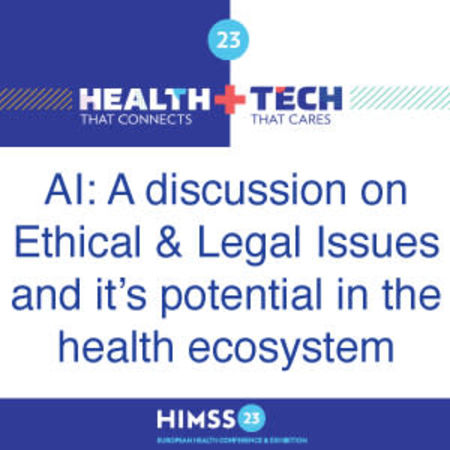Experts discuss cutting-edge case studies in AI, dig deeper into the ethical and legal issues, and engage in discussing methods to maximise AI’s potential in the health ecosystem.
Where are you getting your quality data and how do you track the records?
It is important to provide the need to identify individuals in order to detect patterns of behaviour. However, in our organisation, we ensure that any personally identifiable information is removed from the data during the scraping process. We focus on utilising demographic data and refrain from accessing health data to maintain privacy and security. Additionally, the analysis is matched with the analysis of other datasets related to traffic, transport, and other social determinants of health, highlighting the importance of interoperability and innovation in these areas. It allows us to leverage the enormous amount of data available today while ensuring that only the minimum necessary data is accessible to our staff.
We have observed that many healthcare organisations across Europe and the U.S. are increasingly encouraging openness. This creates opportunities for enhanced data utilisation and analysis, leading to advancements in healthcare practices and outcomes.
Question
One question I would like to address is the possibility of going upstream in data collection, particularly in obtaining more comprehensive data. In my experience, 80% of time and effort is dedicated to decluttering, processing, and making choices, including data normalization and other processing activities. Can you reflect on the ideal model for collaboration between electronic health record (EHR) vendors, hospitals, and governments to provide data that is well-suited for designing decision support systems and other AI tools?
Host
When it comes to probability, it plays a significant role in the development and application of AI technologies. Different industries and sectors have their own standards and guidelines for assessing probability.
We focus on research and innovation activities to develop cost-effective and high-quality technologies. However, one of the challenges we face is integrating our technology with existing pipelines. This includes addressing issues related to low-quality data and ensuring that our web-based experiences yield accurate results, such as a 10-15% improvement in diagnostic outcomes.
Additionally, there are some concerns that we must address as governments and as regulators around how we standardise the clinical trials that we are working on.
It is essential to enforce standardised practices across different hospital systems to ensure consistency and reliability. Currently, there are discrepancies and variations in how different entities interpret and report patient data, even in countries like the UK, which have made significant progress in utilising AI in healthcare.
Professor David Lowe, Clinical Director for health innovation at the Scottish Health and Industry Partnership (SHIP)
It's important to note that while the AI system is valuable in recognising and flagging potential dental issues, it does not replace the expertise and judgment of dental professionals.
To provide a practical example, let's consider a scenario in dental care. Every three months, an AI system is used to identify potential dental issues, which are then exported to a technological environment. The files are digitised and exposed to achieve the desired goals.
Dental surgeons appointed by the Union of Controlled Hotels review these cases and address any discrepancies between the AI system and the European Union standards. The observation is that most of the differences found are linked to human dysfunctions.
The implementation of these AI ecosystems extends to various fields such as radiology, biology, pharmacy, and pathology. The goal is to create professionally efficient ecosystems while maintaining traceability of human involvement. This is operating along the oversight of a national regulatory authority which is appointed by the State.
It is worth noting that human oversight is recognised as a key principle for FDA approval. This principle also applies in the real-life implementation of AI systems, where human oversight is crucial for ensuring compliance, accountability, and making informed decisions.
Speaker
In order for startups to succeed in implementing AI solutions in healthcare, there are several important factors to consider.
Firstly, startups should prioritise access and quality. It is important for them to serve AI solution models, not only as technology, but also as a medical project. By addressing medical objectives and collaborating with hospitals, startups can gain valuable insights and ensure the quality of their datasets, as well as providing access to resources and expertise in both IT and medical aspects.
Secondly, startups need to focus on IT infrastructure. This includes considering social, positive factors and interoperability, as well as integrating the existing healthcare system and user experience both for optimisation and process. Scalability and robust infrastructure are also important, especially when dealing with large amounts of data. Ensuring server security and compliance with regulations are crucial aspects as well.
Next, startups should develop clinical validation of their AI solutions, assessing both clinical efficacy and cost-effectiveness. We need to think about how hospitals and physicians can use this solution. They are key stakeholders from the beginning, defining the models, and testing them in real-world scenarios. Collaborations with healthcare professionals and conducting robust validation studies are vital for gaining regulatory approvals such as FDA or CE Mark.
By addressing these factors, startups can increase their chances of successfully implementing AI solutions in healthcare.
Access to data is a critical factor in AI development, but it can be challenging due to the costs, rules and procedures set by different stakeholders. However, the European Commission has proposed regulations that aim to harmonize data access processes across European countries, making it cheaper and faster for companies to access data.
Another aspect to consider is the transition from research to commercial applications. Often, AI algorithms developed by companies are trialed within the hospital setting, but there may be a lack of understanding of proper business models or commercialization strategies. It is crucial to start thinking more commercially from the beginning.
Tristi Tanaka, Head of the Chief Medical Portfolio - NHS Black Country ICB
The Digital Poverty Alliance in the UK defines digital poverty as the inability of individuals to fully interact with the online world due to limitations in access, skills, or resources. It is important for those working on designing the future of a digitally enabled society to consider the needs and challenges faced by individuals who are not included in the digital society.
Statistics, such as those from the Lloyds Banking Digital Skills Survey and the Consumer Digital Index, highlight the significant number of people in the UK who lack essential digital skills or are offline altogether. This digital divide disproportionately affects individuals with lower incomes, and those who cannot afford broadband services.
When developing digital therapeutics and ways to get patients to be active and participating in the datasets, it is crucial to consciously and intentionally include these populations to better understand their needs and ensure their representation. This inclusion should happen at the local level, so datasets reflect the actual people in their communities.
We need to focus on prevention and ensure we are allocating funds towards prevention strategies, which means bettering our relationship with our communities. By leveraging AI in prevention efforts, healthcare providers can proactively address health concerns and implement interventions at an early stage.
Source: HIMSSEurope23



























